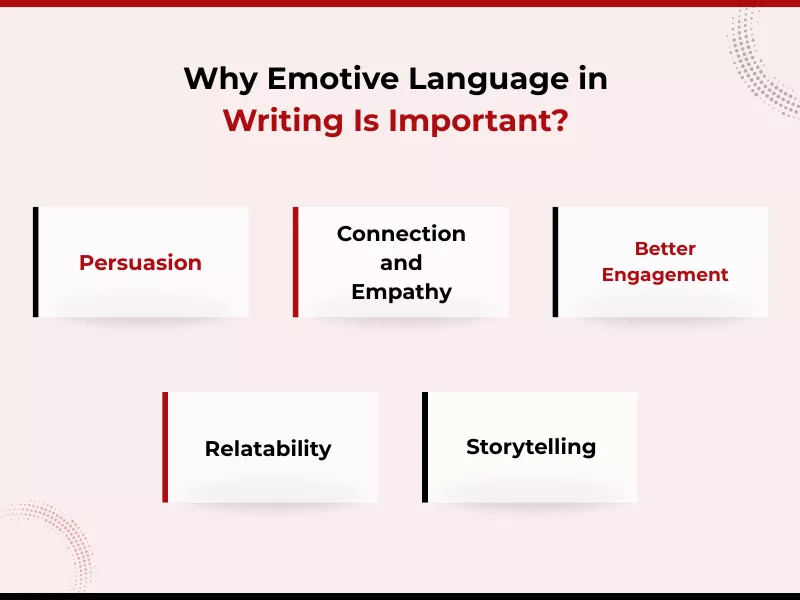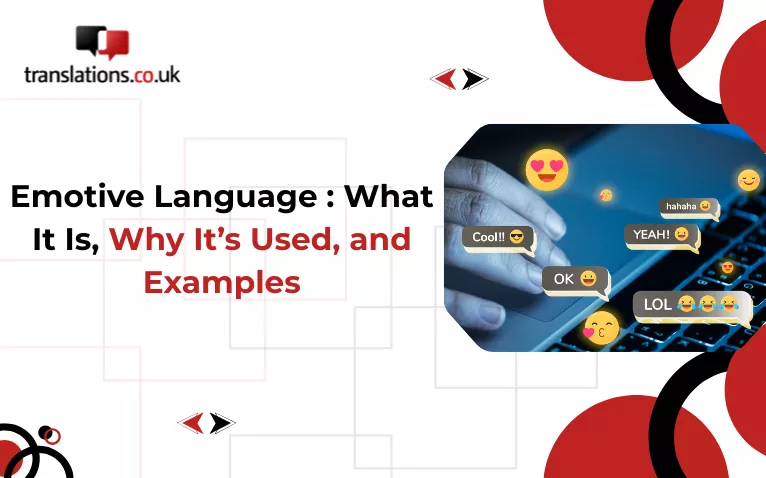‘I have a dream that my four little children will one day live in a nation where they will not be judged by the colour of their skin, but by the content of their character.’
Martin Luther King Jr.
The lines above will make you understand what the person is feeling and relate to the situation. That is what emotive language aims to do. Emotive language can be defined as the language that generates or expresses emotions in the reader’s thoughts.
Knowingly or unknowingly, we have all come across emotive language. Be it a short story, a letter, or a novel, the use of this form of language has been universal. So, if you are willing to know more about this interesting language, let this blog be your learning guide. Here, we will take you through the meaning, the reasons it is used, and share a few examples to make it more relatable.
Emotive language is the use of words chosen to evoke a strong emotional response in the reader or listener, like happiness, anger, sadness, or fear. It is a persuasive technique that uses impactful adjectives, verbs, and nouns to influence opinion, create a connection, and make writing more engaging and passionate.
The main objective of using emotive language is to affect the readers and listeners in a way that they understand and relate to what they are reading or listening to. As a translation service provider, we understand the essence of emotive language and translate every document in a way that it carries the same meaning and conveys the message properly.
Why Emotive Language in Writing Is Important?

The importance of emotive language lies in its persuasion and its role in creating a strong connection with the content. It makes writing more engaging and memorable. For example, MasterCard’s slogan, ‘There are some things money can’t buy. For everything else, there’s MasterCard’, which shows the use of emotive language in persuasion.
Here’s a look at the various reasons showing the importance of emotive language in writing:
A. Persuasion
Emotive language is a strong tool for persuasion. It can help the writer influence a reader’s feelings and perspective, building stronger arguments, be it for an opinion, essay, or speech. Winston Churchill’s ‘We Shall Fight on the Beaches’ speech is a great example of using persuasion to evoke unbreakable resolve and courage against Nazi invasion.
B. Connection and Empathy
Language is an effective tool in helping readers feel emotionally involved. Marketers from around the world use this technique to build their brand in various countries. Airbnb’s ‘Belong Anywhere’ is one of the best examples showing how emotive language is used to create intimacy and encourage social sharing.
C. Better Engagement
Emotive language can enhance engagement and make a story or a marketing slogan memorable. Gillette’s ‘The Best a Man Can Get’ is a great example where the marketers used the emotive technique to connect with customers all over the world. It resonates with the evolving ideals of masculinity, aspiration, and self-improvement.
D. Relatability
One of the most important reasons emotive language is important is that it makes write-ups relatable. The technique helps readers understand what the writer wants to convey, along with the cultural context of the subject matter.
E. Storytelling
In creative and fictional writing, emotive language plays a crucial role in bringing the story to life. Adding on to this, businesses also use this in their storytelling to connect with their customers. Dove’s ‘Real Beauty’ campaign and all the stories associated with it are one of the best examples of how emotive language is used to connect with customers.
A media translation service provider like us understands the significance of this language and how it plays a crucial role for businesses expanding beyond their natural market.
Where Does Emotive Language Get Used?
Emotive language can be used in different ways in everyday life. Here are some of the ways one can use emotive language:
A. Addressing People or Things
Notable speakers often use emotive language to address people and connect with them to leave a lasting impression on their minds.
B. Promotions
Using emotive language in advertising is very common. It is used to grab the attention of a brand’s target audience. Ecommerce translation services aim to bring out the right emotion in a translated ad campaign to build a strong connection with the audience.
C. Poems
The use of this type of language in literature cannot be overlooked. The authors and poets use scholarly strategies to convey the underlying emotions clearly.
D. Announcements
Public assistance declarations are used to inform individuals about various things. Emotive language plays a major role in these announcements as it helps them understand the need for a change.
Referential Language vs. Emotive Language: Know the Difference
Referential language is focused on denotation (literal meaning) to convey facts, data, or specific objects. On the other hand, the purpose of emotive language is to stir emotional responses and persuade. Here’s an insight into the differences:
| Aspect | Referential Language | Emotive Language |
|---|---|---|
| Purpose | To inform, describe, and explain facts | To persuade, evoke feelings, and influence attitudes |
| Focus | Literal, dictionary definitions (denotation) | Implied meanings, feelings, and impressions (connotation) |
| Characteristics | Objective, logical, verifiable, situation-specific | Subjective, emotionally charged, context-dependent |
Emotional appeal in writing is crucial to connect with the readers. However, there’s no way to deny the importance of referential language.
Emotive Language Examples: A Comprehensive List of Emotive Words
Some words mean the same but have a greater impact when they are used. For marketers, copywriters, and translators, finding the right word can help communicate the message effectively. Here’s a category-wise list of emotive words list to help you make the right choice and use them to convey your message correctly:
A. Neutral vs. Emotive Words (Comparison)
| Neutral Word (The Fact) | Emotive Word (The Feeling) | The Psychological Shift |
|---|---|---|
| New | Revolutionary | Implies major change and progress |
| Fast | Instant | Removes the pain of waiting |
| Cheap | Steal/Bargain | ‘Cheap’ implies low quality, ‘Steal’ implies a smart victory |
| Problem | Crisis/Nightmare | Elevates the stakes to demand a solution |
| Like | Adore/Crave | Shifts from preference to deep desire |
| Help | Empower | Shifts from assistance to giving control |
B. Emotive Words by Category
Words that build trust and safety
- Authentic
- Guaranteed
- Proven
- Secure
- Backed
- Official
- Lifetime
Words that trigger urgency
- Now
- Deadline
- Limited
- Seize
- Last chance
- Today
- Instant
Words that evoke curiosity
- Secret
- Confidential
- Hidden
- Uncovered
- Behind-the-scenes
- Banned
Negative emotive words
- Risky
- Mistake
- Exhausting
- Dangerous
- Mediocre
- Confusing
While these words are often used to create a connection in literature, using them in business or marketing materials might be dangerous. For example, high-urgency keywords like ‘deadline’ or ‘demanding’ can come across as rude or aggressive in cultures that value politeness and indirect communication, like those in Japan or Thailand.
The Global Challenge: Translating Emotive Language in Marketing
English is a language that carries rich emotive nuances. While that acts well in literature, it might not be the same for businesses. Emotions are deeply cultural. A word that means ‘trust’ in the UK might mean ‘suspicion’ in Germany.
Word-for-word translation of emotive languages is not the best way for businesses that aim to go global. This is a reason businesses trust professional translation services to get the best results.
Now, what do these businesses do? They don’t translate, they transcreate.
Transcreation is defined as creative translation, where the professional translator understands the feeling and the message, not just the word. Here are a few examples to help you understand the difference better:
A. Coca-Cola in China
Coca-Cola literally became ‘Bite the Wax Tadpole,’ which sounded nonsensical and unappealing. It was transcreated to Kekou Kele, which meant ‘tasty and fun’, thus appealing to the market and achieving success.
B. Nike’s ‘Just Do It’
The well-known slogan was not directly translated but transcreated for the markets in Japan to preserve motivational urgency. This helped maintain the global emotional consistency amid cultural nuances.
C. KitKat’s Have a Break, ‘Have a KitKat’
The slogan was transcreated to Kitto Katto, playing on Kitto for ‘surely’ and ‘good luck.’ It resonated with the students, and sales surged immediately.
D. KFC Post-Failure Recovery
KFC’s ‘finger-lickin’ good’ flopped in China as it translated to ‘eat your fingers off.’ The slogan was eventually adapted to convey ‘It’s finger-lickin’ good, because it’s so tasty.’ This helped rebuild trust and emotional appeal.
You can go through the common Spanish translation fails as well to understand the need for professional translation services.
At Translations.co.uk, we understand the significance of transcreating to ensure the brands are able to convey their message correctly. You can talk to us and share your requirements to get the best transcreation solutions.
Final Thoughts,
Global campaigns and marketing speeches are not restricted to words; these are more about the emotional bridge between your brand and your audience. However, when it comes to brands, there are high chances of the brands being unable to convey their messages correctly. Simple word-for-word translation has never been enough for businesses, and the only solution to the problem is transcreation.
Transcreation helps convey the right emotion and connect with the audience. So, if you are struggling to make your brand heard the right way in a new market, contact us for transcreating your brand message.
Frequently Asked Questions
What challenges do businesses face when using emotive language globally?
They risk cultural misinterpretation since emotions are culturally specific. Words evoking positivity in one culture might cause offense or confusion in another, which can damage brand reputation without careful adaptation.
How does emotive language improve advertising effectiveness?
It forges personal connections by triggering emotional responses that motivate consumers to act, remember the brand, and share content, going beyond logical appeals to touch the heart.
Can emotive language backfire in marketing?
Yes, if overused or insensitively applied, it may appear manipulative or insincere, leading to consumer distrust. It can also clash with cultural norms about politeness or directness, making messages counterproductive.
Why is transcreation better than direct translation for emotive content?
Transcreation adapts tone, cultural references, and emotional triggers to preserve intended feelings and brand voice, ensuring messages resonate naturally in local markets instead of sounding awkward or wrong.
What role do emotive verbs play in storytelling and marketing?
They vividly express feelings and actions, making narratives dynamic and relatable. Emotive verbs energize language, helping readers or consumers experience the intended emotional journey.
How can marketers choose the best emotive words for diverse audiences?
By researching cultural values and emotional triggers within target markets and testing language with local audiences, marketers can select words that inspire the desired emotion without unintended negative connotations.
- Why Does French Use Ne and Pas? A Guide to French Negation - 30th December 2025
- Emotive Language: What It Is, Why It’s Used, and Examples - 5th December 2025
- The Minion Language: A Dive into its Features and Characteristics - 25th November 2025

